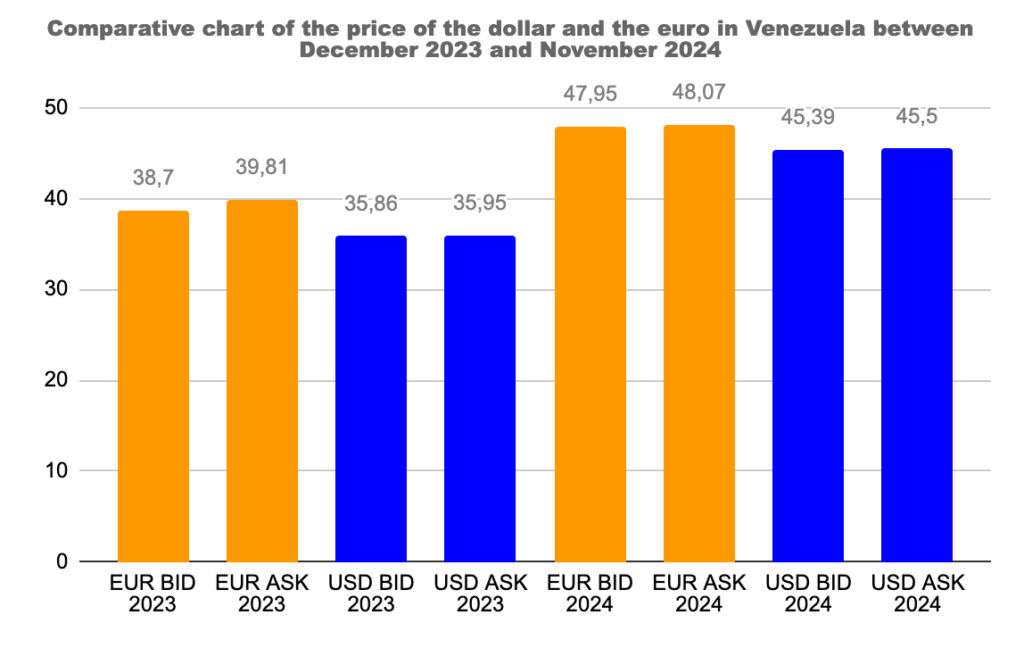Ethereum’s Onchain Activity Hits Historic Levels Heading Into 2026
Venezuelan bolívar loses 24% against the dollar in one year: here’s why
(Originally posted on : Invezz )
The Venezuelan bolívar has lost 24% of its value against the US dollar over the past year, exacerbating the country’s ongoing economic struggles.
In the last eight weeks alone, the official exchange rate set by the Central Bank of Venezuela has dropped from 36.7 to 45 bolívares per dollar.
This sharp decline is largely driven by growing distrust in the bolívar’s stability, compounded by the country’s deepening political and economic uncertainties following the July 28th election.
Venezuela’s currency depreciation
The looming uncertainty surrounding Venezuela’s next election has contributed to a volatile currency market, unseen in almost ten months.
As confidence in the bolívar wanes, businesses that once resumed trading in the national currency are now shifting back to foreign currencies.
Over 60% of transactions are still made in bolívares, but this marks a significant drop from the 76% two years ago, according to economist Aldo Contreras.
The bolívar’s rapid depreciation is also hurting businesses reliant on imports and dollar-based costs, leading to financial losses.
In an attempt to stem the tide, the Central Bank has injected $60 to $70 million into the foreign exchange market, but experts argue this is only a short-term fix, addressing symptoms rather than the underlying causes of the bolívar’s decline.
The Euro gaining ground in Venezuela
As Venezuela struggles with its currency crisis, the euro is becoming an increasingly popular alternative to both the bolívar and the dollar.
With unpredictable exchange rates and government restrictions on the parallel dollar market, businesses are opting to charge in euros to avoid the disparity between official and black market dollar rates.
As of November 15, the official exchange rate for the dollar was VES 45.5, while the parallel rate stood at VES 53.5, a 17.5% difference.
The euro’s growing role is a clear indicator of widespread distrust in both the bolívar and the dollar.
The exchange rate for the euro has surged 20.75% from December 2023 to November 2024 and by 24% against the dollar.
As a result, consumers paying in bolívares may face a 16% price increase as businesses adjust their prices to account for the currency volatility.

Chart created by Invezz using Venezuela’s Central Bank data
Reason behind bolívar’s depreciation
The bolívar’s collapse is rooted in multiple economic challenges, including political instability, an expanding money supply, and a lack of credible credit systems.
The Central Bank’s failure to implement transparent and effective economic policies further undermines investor confidence and hinders any potential recovery.
Contreras emphasizes that a coherent, transparent approach to monetary policy, along with strategic foreign investments, is critical to restoring confidence in the bolívar.
Without these measures, Venezuela’s economy remains vulnerable to further instability.
The devaluation of the bolívar is not just impacting businesses and investors—it’s also significantly affecting consumer behavior. Economists predict a 20% to 30% drop in sales during the upcoming holiday season as Venezuelans tighten their belts amid rising prices and dwindling resources.
Many are already demanding foreign currency for transactions or converting their savings into dollars, further distorting the local market.
The economic challenges facing Venezuela are vast, and the decline of the bolívar is a direct result of political and economic instability. To reverse the downward spiral, Venezuela needs comprehensive reforms that restore trust in its currency, stabilize the economy, and attract foreign investment.
Without such reforms, the country’s path to recovery remains uncertain, and the outlook for economic stability appears bleak.
As Venezuela navigates post-election changes, both domestic and international stakeholders will be watching closely to see how policymakers address these critical issues.
The post Venezuelan bolívar loses 24% against the dollar in one year: here’s why appeared first on Invezz







 Bitcoin
Bitcoin  Ethereum
Ethereum  Tether
Tether  XRP
XRP  USDC
USDC  Wrapped SOL
Wrapped SOL  TRON
TRON  Lido Staked Ether
Lido Staked Ether  Dogecoin
Dogecoin  Figure Heloc
Figure Heloc  Cardano
Cardano  Bitcoin Cash
Bitcoin Cash  WhiteBIT Coin
WhiteBIT Coin  Wrapped stETH
Wrapped stETH  Wrapped Bitcoin
Wrapped Bitcoin  USDS
USDS  Wrapped eETH
Wrapped eETH  Chainlink
Chainlink  Binance Bridged USDT (BNB Smart Chain)
Binance Bridged USDT (BNB Smart Chain)  LEO Token
LEO Token  Zcash
Zcash  WETH
WETH  Monero
Monero  Stellar
Stellar  Coinbase Wrapped BTC
Coinbase Wrapped BTC  Litecoin
Litecoin  Ethena USDe
Ethena USDe  Sui
Sui  Avalanche
Avalanche  Hyperliquid
Hyperliquid  Canton
Canton  Hedera
Hedera  Shiba Inu
Shiba Inu  World Liberty Financial
World Liberty Financial  sUSDS
sUSDS  USDT0
USDT0  Toncoin
Toncoin  Dai
Dai  Cronos
Cronos  Uniswap
Uniswap  PayPal USD
PayPal USD  Polkadot
Polkadot  Ethena Staked USDe
Ethena Staked USDe  USD1
USD1  Mantle
Mantle  MemeCore
MemeCore  Rain
Rain  Pepe
Pepe  Bitget Token
Bitget Token  Aave
Aave  Bittensor
Bittensor  OKB
OKB  Tether Gold
Tether Gold  NEAR Protocol
NEAR Protocol  Falcon USD
Falcon USD  Ethereum Classic
Ethereum Classic  Jito Staked SOL
Jito Staked SOL  Binance-Peg WETH
Binance-Peg WETH  Ethena
Ethena  Aster
Aster  Pi Network
Pi Network  BlackRock USD Institutional Digital Liquidity Fund
BlackRock USD Institutional Digital Liquidity Fund  Internet Computer
Internet Computer  PAX Gold
PAX Gold  Worldcoin
Worldcoin  HTX DAO
HTX DAO  Global Dollar
Global Dollar  Circle USYC
Circle USYC  Midnight
Midnight  Jupiter Perpetuals Liquidity Provider Token
Jupiter Perpetuals Liquidity Provider Token  KuCoin
KuCoin  Aptos
Aptos  Sky
Sky  Binance Staked SOL
Binance Staked SOL  syrupUSDC
syrupUSDC  Pump.fun
Pump.fun  Ripple USD
Ripple USD  Ondo
Ondo  BFUSD
BFUSD  Binance Bridged USDC (BNB Smart Chain)
Binance Bridged USDC (BNB Smart Chain)  Rocket Pool ETH
Rocket Pool ETH  Wrapped BNB
Wrapped BNB  Gate
Gate  POL (ex-MATIC)
POL (ex-MATIC)  Arbitrum
Arbitrum  MYX Finance
MYX Finance  Algorand
Algorand  Cosmos Hub
Cosmos Hub  Filecoin
Filecoin  Official Trump
Official Trump  Janus Henderson Anemoy AAA CLO Fund
Janus Henderson Anemoy AAA CLO Fund  Bridged Wrapped Lido Staked Ether (Scroll)
Bridged Wrapped Lido Staked Ether (Scroll)  VeChain
VeChain  Function FBTC
Function FBTC